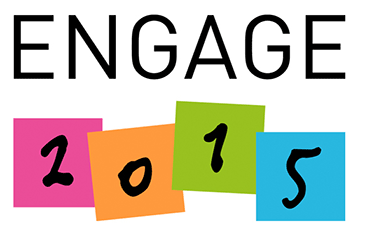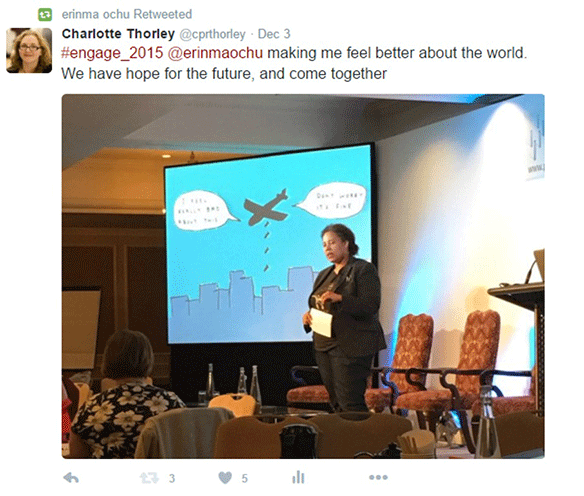Engage 2015 – Reframing impact and strengthening relationships

Written by Charlotte Thorley, Executive Officer for Public Engagement
Earlier this month the Centre for Public Engagement team attended the Engage 2015 national conference for public engagement, hosted by the National Co-ordinating Centre for Public Engagement (NCCPE).
Rather than tell you about the individual sessions I attended this year, here are my take-away messages from Engage 2015…and as social media plays such an important part of my interactions at the conference, I have let twitter guide me!

Being engaged needs time, and thought
Keri Facer presented us with the concept of skohlé, a time to break out of our routine and think afresh about the world.
This sums up my experience of the Engage 2015 conference, and seems particularly relevant as we wind down towards the end of 2015. Thanks to the conference, for the first time in ages I had time to reflect on my own practice (and that of my institution) whilst also being challenged to think critically about our work. Such time is precious! But this sort of thinking space is essential to ensuring quality in public engagement, so I am challenged now to go back to QMUL and look at how we create these spaces for our academics and community partners.

As institutions we need to be open to change, and being changed
It was lovely to hear from Rajesh Tandon about the work he does as part of PRIA (Participatory Research in Action) in India. He posed a really important point to us all: if we are truly working in partnership then the impact of a project won’t just be a thing that happens to or for the community partner.
True partnership will impact on both sides, changing the way each partner works and culminating in joint outputs that will impact on each of them as well as wider society. Follow on discussions reflected the difficulties this raises in many HEIs in the UK, where academic culture is not yet used to considering how their work might be changed by a community partner. But overall the response was positive, showing how far we have come towards a culture of engaged research.

We’re in this together
It’s the nature of public engagement that those of us advocating for engaged approaches are sometimes isolated within a department or institution, facing regular battles to defend our approaches. Being a change agent can be hard! But you are not alone. Engage reminds me each year of what a wide network I have, and of the places where I can find support.
There were plenty of sessions to help; the Catalysts for Public Engagement joined forces with a Beacon and the new Catalyst Seed Fund institutions to talk about creating sustainable culture change in their organisations, Bath’s public engagement unit offered some advice for change makers, and Jo Marriott from UCLAN showed us how progress can be made without the sorts of external support and funding the Beacons and Catalysts had. But what really struck home was the response in the final plenary to the grand challenges posed to us by Imran Khan, Angie Hart, and Erinma Ochu:
- How radical can we be in the ways non-academics interact with our decision-making?
- What if engaged research was the most important type of research, including in REF?
- How can we work together with all communities to create a positive future?
These are somewhat paraphrased, but the point remains: how can we take action for the greater good? The sorts of people you meet at Engage are those that take responsible research and engaged teaching really seriously, and so we take these challenges to heart. We could be discouraged by them, see them as unsurmountable, but the response was clear: let’s do this, and let’s do it together.
Written by Charlotte Thorley
Executive Officer for Public Engagement
Centre for Public Engagement